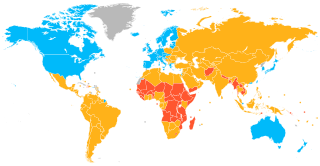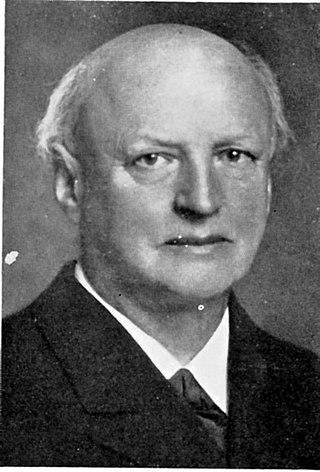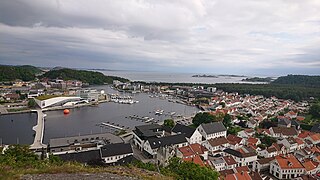Hans Henrik Scheel | |
|---|---|
 Scheel in 2016 | |
| Born | 22 September 1956 |
| Nationality | Norwegian |
| Occupation(s) | economist and civil servant |
Hans Henrik Scheel (born 22 September 1956) is a Norwegian social economist and civil servant.
Hans Henrik Scheel | |
|---|---|
 Scheel in 2016 | |
| Born | 22 September 1956 |
| Nationality | Norwegian |
| Occupation(s) | economist and civil servant |
Hans Henrik Scheel (born 22 September 1956) is a Norwegian social economist and civil servant.
Scheel graduated from the University of Oslo in 1985.
Scheel served as director of the Statistics Norway from 2011 to 2015. He has been member of three governmental tax commissions, including chairman of the Scheel Commission . [1]

The International Monetary Fund (IMF) is a major financial agency of the United Nations, and an international financial institution funded by 190 member countries, with headquarters in Washington, D.C. It is regarded as the global lender of last resort to national governments, and a leading supporter of exchange-rate stability. Its stated mission is "working to foster global monetary cooperation, secure financial stability, facilitate international trade, promote high employment and sustainable economic growth, and reduce poverty around the world."
Special drawing rights are supplementary foreign exchange reserve assets defined and maintained by the International Monetary Fund (IMF). SDRs are units of account for the IMF, and not a currency per se. They represent a claim to currency held by IMF member countries for which they may be exchanged. SDRs were created in 1969 to supplement a shortfall of preferred foreign exchange reserve assets, namely gold and U.S. dollars. The ISO 4217 currency code for special drawing rights is XDR and the numeric code is 960.

A developed country, or advanced country, is a sovereign state that has a high quality of life, developed economy, and advanced technological infrastructure relative to other less industrialized nations. Most commonly, the criteria for evaluating the degree of economic development are the gross domestic product (GDP), gross national product (GNP), the per capita income, level of industrialization, amount of widespread infrastructure and general standard of living. Which criteria are to be used and which countries can be classified as being developed are subjects of debate. Different definitions of developed countries are provided by the International Monetary Fund and the World Bank; moreover, HDI ranking is used to reflect the composite index of life expectancy, education, and income per capita. In 2023, 40 countries fit all four criteria, while an additional 19 countries fit three out of four.

The Bretton Woods Conference, formally known as the United Nations Monetary and Financial Conference, was the gathering of 730 delegates from all 44 allied nations at the Mount Washington Hotel, in Bretton Woods, New Hampshire, United States, to regulate what would be the international monetary and financial order after the conclusion of World War II.

The Group of Ten refers to the group of countries that agreed to participate in the General Arrangements to Borrow (GAB), an agreement to provide the International Monetary Fund (IMF) with additional funds to increase its lending ability.
Norges Bank is the central bank of Norway. It is responsible for managing the Government Pension Fund of Norway, which is the world's largest sovereign wealth fund, as well as the bank's own foreign exchange reserves.

The Intergovernmental Group of Twenty-Four on International Monetary Affairs and Development, or The Group of 24 (G-24) was established in 1971 as a chapter of the Group of 77 in order to help coordinate the positions of developing countries on international monetary and development finance issues, as well as and to ensure that their interests are adequately represented in negotiations on international monetary matters. Though originally named after the number of founding Member States, it now has 28 Members. Although the G-24 officially has 28 member countries, any member of the G-77 can join discussions.

Waldemar Christofer Brøgger FRSE was a Norwegian geologist and mineralogist. His research on Permian igneous rocks of the Oslo district greatly advanced petrologic theory on the formation of rocks.

The Norwegian Meteorological Institute, also known internationally as MET Norway, is Norway's national meteorological institute. It provides weather forecasts for civilian and military uses and conducts research in meteorology, oceanography and climatology. It is headquartered in Oslo and has offices and stations in other cities and places. It has around 500 full-time staff and was founded in 1866.
Events in the year 1803 in Norway.

Øystein Olsen is a Norwegian public servant who served as Governor of the Central Bank of Norway from 2011 to 2022.
Johan Christopher Ræder was a Norwegian military officer.

Anton Henrik Ræder was a Norwegian educator, philologist and historian. He is most commonly known for his history textbooks relating to the Roman Empire.

YannisStournaras is a Greek economist who has been the Governor of the Bank of Greece since June 2014.

Hans Jacob Scheel was a Dano-Norwegian Major-General.
Thorbjørn Gjølstad was a Norwegian jurist and civil servant.

Henrik Syse is a Norwegian philosopher, author, and lecturer. He is a research professor at the Peace Research Institute Oslo (PRIO), and a part-time Professor of Peace and Conflict Studies at Bjørknes College in Oslo. He was a member of the Norwegian Nobel Committee, which awards the Nobel Peace Prize, from 2015 to 2020, and was a member of the Norwegian Press Complaints Commission from 2002 to 2016. Syse also teaches at the Norwegian Defence University College, BI Norwegian Business School, MF Norwegian School of Theology, the University of Oslo, and other institutions of higher learning, and he is Chief Editor of the Journal of Military Ethics, a peer-reviewed journal published by Taylor & Francis.

Mandal is a town in Lindesnes municipality in Agder county, Norway. Mandal is the fourth largest town in Agder as well as the administrative centre of Lindesnes municipality. It is located at the mouth of the river Mandalselva at the southern end of the Mandalen valley. The 6.63-square-kilometre (1,640-acre) town has a population (2019) of 11,053 and a population density of 1,667 inhabitants per square kilometre (4,320/sq mi). In Norway, Mandal is considered a by which can be translated as either a "town" or "city" in English.